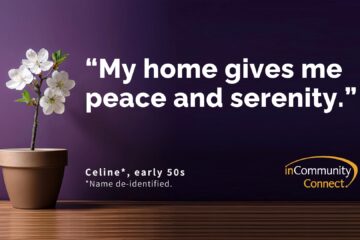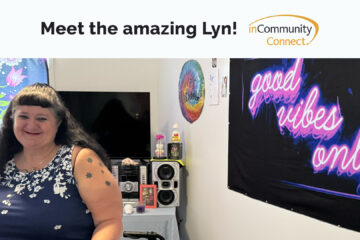It’s a precious moment for our organisation to hear from someone who engaged with our services more than a decade ago. So when Terry, now in his early 30s, picked up the phone to call us some 14 years after our organisation first met him, we knew he would have a special story to share.
Now happily married and after over a decade-long career of working his way up in hospitality from dishy to kitchen manager, Terry is now taking a small career breather, working in a less taxing role whilst he contemplates a career change.
What is clear in speaking with Terry is that life is calm, steady, and he is content.
“I’m in a great place – my wife, family and friends, lifestyle. I also understand what I need to do to succeed. I like everybody and have a big, social battery, but I also need to take time for myself to recharge,” he shares.
So why make contact after all these years?
Terry shares that he felt compelled to get in touch as he was eager to see if the case managers who had made such a profound impact on his young life were still here. However, with so many years passing, including our organisation’s name change to inCommunity from Ipswich Independent Youth Service in 2017, he knew the chances of reconnecting were slim.
So after seeing a few familiar faces on the inCommunity website in his latest internet search, he picked up the phone once more and was delighted to be put through to a friendly and familiar voice.
“I was so happy to talk to Chrissy, and it was mind-blowing to hear that almost all of the workers were still within the organisation, other than one who had deservedly retired. After all these years, I really needed to find them. To share how I was doing, but also to see how they were. To hear that they’re still going strong is a huge comfort to me.” He says.
Let’s rewind the clock to the early 2010s
“I remember that first phone call I made. I spoke to Paul and told him I had been kicked out of the house and needed somewhere to go. I had previously been homeless, and while I had experienced kindness from a stranger who ensured my friend and I did not go hungry and could couch surf, I knew how hard it would be if I couldn’t find accommodation.” Terry shares.
When a room became available at the Lewis Street Crisis Accommodation for Indigenous young men, managed by inCommunity at the time, Terry, a proud Kullilli and Wakka Wakka man, jumped at the chance for a secure roof over his head.
Early learnings
This would be the beginning of a long connection between Terry and inCommunity, as he made his way as a young man in his late teens/early 20s, navigating relationships, employment and learning the skills to sustain long-term housing.
Terry first spent time in our supported crisis accommodation programs.
“At that time, I wasn’t always making good choices for myself, and it was sometimes a bumpy ride,” he shares. “But the workers made a huge impact. They got me in the routine of making my bed every morning, cleaning my sheets.
New routines that became easier and repetitive, and I was learning to start things and continue with them. It was a simple foundation, but a foundation for something better.
Even cooking meals, not just for myself but for others. Chrissy would spend time with me cooking once or twice a week. Really, it was what drove my passion to get into a career in hospitality. I also would yarn with Chrissy any chance I could. I learned a lot from her.”
A low becomes a turning point
Following Terry’s natural growth in these programs, he moved out into another inCommunity program. This time, living in his own unit, he initially showed great promise. But having struggled with gambling previously, Terry relapsed and began to fall behind in his rent. His prospects were once again looking stark.
“I remember getting a call from Paul, who said that I was behind in my rent. It was tough to hear this. He said that he didn’t want me to become homeless again and that they had a new program that I could go into. I remember him being really clear though that this was my last chance to get things back on track.
Chrissy also really motivated me at the time to make a fresh start. To take responsibility for myself and start doing the right thing. Paul even came down and showed me how to fix a door and freshly paint it to return the unit to its original condition before I moved out.
This was a big turning point for me and I’m not sure what would have happened to me if they didn’t give me that one last chance.
I also remember Paul saying at the time to always make sure your bills are paid. Make sure you’re coming back to a roof over your head and food in your stomach. That has always stuck with me.” Terry shares.
A fresh start
Terry’s low point coincided with the launch of inCommunity’s SPin (Supporting People in) Housing Program, which is still going strong today. Terry and his flatmate at the time were the first tenants to enter the program established for young people aged 16 to 25 years.
There, Terry could build a strong rental history whilst gaining tenancy experience via a Rooming Accommodation Agreement. Terry learned to communicate with others to address common dynamics that occur in a sharehousing environment, whilst also addressing his gambling addiction via other services, learning skills to self-exclude and prioritise his living expenses first.
Terry fondly looks back on his time in the SPin program and remains friends with his SPin flatmate. And it is upon his exit from this program, when he and his flatmate started to move in different directions, that this was his last contact with inCommunity for more than a decade.
Life after inCommunity
So, what happened in those years since Terry left inCommunity’s SPin program, to where we find him today – a happy and thoughtful man in his 30s?
Terry explains that the road was bumpy at times and not without its hiccups, sometimes returning to gambling, often with heavy consequences.
Only a couple of years into this next chapter, Terry was invited by a friend to move to a new state. An offer he accepted as a chance to start a new chapter and figure out the person he wanted to be, and would become.
While contemplating his new future, it became clear to Terry that the case managers with whom he had spent so much time had also left a strong impression on him and served as role models for the type of person he envisioned becoming.
“Knowing there are different life role models, like the case managers, made such a huge impact on me. They had provided advice and guidance that stuck with me, and my thought process really started to change. I stopped messing about and sought out the right way to do things.” Terry says.
From spending time with Chrissy and Paul, as well as other case managers such as Darren, Nick, Rachel, and Sandra, Terry shares that he knew he wanted to be a strong leader who is gentle and kind, and he also understood the type of positive relationships he could create for himself.
“When I returned to Queensland, things really started to fall into place for me. I got my own place in a caravan park, I reconnected with my now wife, who I had known since I was a teenager, and it’s when things really took off for me,” Terry says with great pride.
Accepting the help of others
Being in such a good place now, Terry is quick to share that he didn’t do it alone.
“I didn’t get to where I am now without people helping me in every way that they could, whether it was the case managers, friends or my Dad.
It’s never easy by yourself, so I would encourage anyone who might be experiencing homelessness to ask for help. It takes courage but it’s much better than struggling to get by on your own.
I’m so different now. I’ve had a steady line of employment and always pay the bills – rent, food, electricity, water, and, in our case, streaming services and internet. I also know my limits as a recovering gambling addict.
Ultimately, I try to be kind to everyone. If you approach someone with kindness and respect, it generally comes back to you. The majority of people will help you.”
With reflection also comes a clear focus for the future, and Terry shares,
“Ten years from now, I hope my wife and I will have kids of our own, and that I will continue to be a progressive earner and learner in my career. Every task I do at work, I’m always doing it to the best of my ability. Multi-tasking for greater efficiency and keeping my work ethic strong.
I’ve had the benefit of role models who have said to me they know what it’s like to be in my position and to work through the hard times. So I always try and help people, and this is something I will continue to do in the future.”
And with that, Terry has come full circle from that first phone call to inCommunity all those years ago. His thoughtful reconnection with our team is a source of pride for him, as well as for each of our case managers, who fondly remember him from those early days.
For our team to know that Terry’s time engaging with inCommunity has empowered him to progress forward, take pause when needed, and ultimately thrive, fills our cup. It’s at the heart of inCommunity’s philosophy, back then as it is today, and Terry’s story is a wonderful affirmation of our why: we inspire people so that they believe they can.


